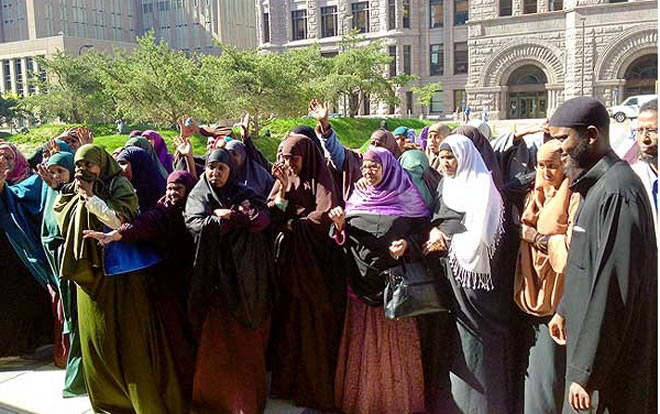
Supporters of two Somali women gather outside the Hennepin County Government Center on Thursday, May 16, 2013, in Minneapolis as they await to hear the sentencing of Amina Farah Ali and Mohamed Hassan for helping a terrorist group. (MPR Photo/Brandt Williams)

by Brandt Williams, Minnesota Public Radio
Friday, May 17, 2013
Attorneys representing the women had requested much shorter sentences and say they are disappointed by the decisions of U.S. District Judge Michael Davis. Some members of the Somali community say they are upset by the length of the sentences and were offended by how the women were treated in court.
Federal marshals had to turn away spectators who wanted to observe the sentencing of the two women. The long wooden benches in the gallery of the courtroom were packed mostly with women clad in traditional Muslim dress which covered everything but their faces.
Amina Farah Ali and Hawo Mohamed Hassan had been convicted of helping send money to al-Shabab, which the U.S. government considers a terrorist group. Ali was convicted in 2011 for being the founder of a network of donors across North America who funneled money to al-Shabab.
Prosectors said Ali, who was sentenced to 20 years, did not tell donors that the funds were going to help the terror group wage war in Somalia. Defense attorney Dan Scott said Ali, 36, was trying to help the poor and needy. He said she started the fundraising network after finding out that much of the aid sent to her homeland by international groups often got intercepted by corrupt government officials. Scott said she used members of al-Shabab to ensure the aid got to the right people.
"(Ali) was worried the clothes she sent would go to the wrong people," said Scott said. "Al-Shabab was the wrong horse, but not illegal at the time. At the time they were not recognized as a terrorist group."
Hassan was sentenced to 10 years. Defense attorney, Randy Daar, said his client was also motivated by her concern for the poor and needy. He feared that a long sentence would be a death sentence for the 66-year-old Hassan.
"It's very unlikely she'll live past 80," Daar said.
Before issuing the punishments, Davis took time to ask each woman if they supported jihad, suicide bombings and Sharia law. "Does she understand there are some Muslim women who wear dresses or short skirts?" Davis asked Hassan's interpreter. Davis said the questions were to determine the likelihood of the women to continue to support terrorist causes when they are released from prison. The questions often caused ripples of reaction in the courtroom gallery.
"Those religious questions were inappropriate," said Hassan Mohamud, a St. Paul imam. "Because every American -- every American in America, whether you are Somali or not -- has First Amendment rights."
Mohamud also attended the other sentencing hearings this week for nine people convicted of terror-related charges. The nine were snagged in a sweeping federal investigation into the recruitment of nearly two dozen young men from Minnesota to fight for al-Shabab in Somalia. Some of those men received shorter sentences than either Ali or Hassan. One man, who trained with al-Shabab fighters and was involved in a skirmish with Ethiopian soldiers, was also given 10 years.
Abdiwali Warsame, who lives in St. Paul and runs a Somali news website, said the punishment given to the women was unfair.
"They didn't go back home. They didn't kill anyone. They just helped with the poor people," Warsame said. "They are the first people who build the home care in Somalia. It was helping the elders' people. This is what's happening here -- it's unjustice."
Despite the reactions in the courtroom, federal prosecutors have said the al-Shabab investigation is a testament to the trust Somali people have placed in the federal government. They say the investigation began in 2007 after being approached by Somali elders seeking help in finding the young men who disappeared.
Source: MPR